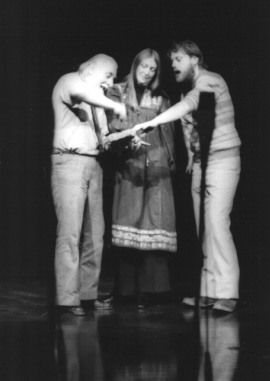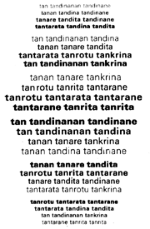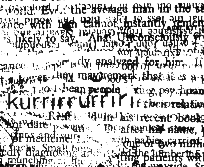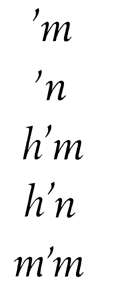Bob Cobbing

Konkrete Canticle
'performing' a rock at the
11th International Sound Poetry Festival, Toronto, 1978
Photo by Larry Wendt..
Bob Cobbing was the first explorer of sound
poetry in England and a long-time experimenter in visual and performance
poetry. His activities beginning with the Hendon Experimental Art Club in 1951
eventually grew into his press, Writers Forum which began publishing in 1963.
Within ten years he produced over a hundred small press publications of
experimental writing with hardly no budget. His weekly Experimental Poetry
Workshop and numerous performances of his own poetry, influenced a whole
generation of English experimental poets.

tan
tandinane
His works in the visual, sonic and performance medias are
extensive, widely varied and difficult to classify. Much of it is based around
the idea of the world being alive with messages, which can sympathetically
provoke a paroxysmal dance of the vocal chords.
 Anything can act as a score, a cue-sheet to guide the
voice and the body, whether it be marks on paper, the pattern on a leaf, a
printed circuit board, or the textures of a stone -- it is all text to be read
by Cobbing: Visual poetry is the plan, sound poetry the impulse; visual
poetry the score and sound poetry your actual music for dancing
[1].
Anything can act as a score, a cue-sheet to guide the
voice and the body, whether it be marks on paper, the pattern on a leaf, a
printed circuit board, or the textures of a stone -- it is all text to be read
by Cobbing: Visual poetry is the plan, sound poetry the impulse; visual
poetry the score and sound poetry your actual music for dancing
[1].
Detail from kurrirrurriri (1967)
Cobbing had done several sound poetry pieces using the tape
recorder in sixties and seventies, and thought considerably about the
ramifications of his experiments as he wrote in 1971:
We are aided in our search by sophisticated instruments, the
tape-recorder. Our human voices extend the range of the tape-recorder's
abilities by their demands upon it. Conversely, the tape-recorder's treatment
of the voice teaches the human new tricks of rhythms and tone, power and
subtlety. In tonal and thematic terms are opened out solid, liquid, gas. We are
in a position to claim a poetry which is musical and abstract; but, however
hard we try to do so can we escape our intellect? In an article like this, no;
but in the poetry of pure sound yes. Some of the pioneers of sound poetry,
notably Henri Chopin and François Dufrêne, have transcended
intellect, celebrated reunion with music and entered already the age of gas.
 Materials are the micro-particles of the human voice
which amplified, possibly transposed in speed or pitch, superimposed one, two
or many times, treated perhaps with filter echo or chopper, shaped maybe by
editing, result in a piece no naked voice could achieve; though I can conceive
of a choir of voices which might attain to similar flights. In fact, the great
debate among sound poets at present relates to how much one can release from
the unaided human voice and how little or how much electronic treatment is wise
or necessary... [2]
Materials are the micro-particles of the human voice
which amplified, possibly transposed in speed or pitch, superimposed one, two
or many times, treated perhaps with filter echo or chopper, shaped maybe by
editing, result in a piece no naked voice could achieve; though I can conceive
of a choir of voices which might attain to similar flights. In fact, the great
debate among sound poets at present relates to how much one can release from
the unaided human voice and how little or how much electronic treatment is wise
or necessary... [2]
In his later years, Cobbing discarded the use of tape in
his live performances and became a strong practitioner in acoustical techniques
which he felt had a far more resonant and richer articulatory control over the
sonic aspects of expression than anything that one could gain by performing
with tape or electro-acoustic devices. Typical of the acoustic practitioners of
sound poetry, he is also a strong proponent of 'a choir of voices' in
performance. The Konkrete Canticle, one of his more well-known groups,
was formed in 1971 and included Paula Claire and Michael Chant (and later Bill
Griffith). He has toured and performed with several other sound poets and
improvisatory musicians since that time. Most recently he is touring and
recording material with musician Hugh Metcalfe.
References:
1. Bob Cobbing, 'Music for Dancing.' Stereo
Headphones No. 4; edited by Nicholas Zurbrugg (Suffolk, England: Zurbrugg,
1971).
2. Bob Cobbing, 'Poetry for a new age,' KROKLOK 2
(London: Writers Forum, September, 1971).
Other publications of interest:
'Bob Cobbing Interviewed by Nicholas Zurbrugg,' in Art & Design No.
45: The Multimedia Text (London: Academy Group Ltd., 1995), pp. 32-37.
Bob Cobbing, KROKLOK, with dom silverster houédad and Peter
Mayer as editors (London: Writers Forum). A journal of historical and
contemporary sound poetry texts. There were four issues: No. 1 (1971), no. 2
(Sept. 1971), no. 3 (Dec. 1972), and no. 4 (n. d.).
Bob Cobbing, Sound Poems (also known as the A B C in Sound)
and Ernst Jandl, Sprechgedichte (London: Writers Forum Record No. 1,
September 1965). From material produced at the BBC.
Peter Mayer, ed., Bob Cobbing & Writers Forum (Sunderland:
Ceolfrith Press, Ceolfrith 26, October 1974). Catalog for a Bob Cobbing
and Writers Forum Retrospective Exhibition at the Sunderland Arts Centre in
1974.
Konkrete Canticle, Experiments in Disintegrating Language (London:
Arts Council of Great Britain, 1971). An lp of works performed by Konkrete
Canticle written by Charles Verey, Neils Mills, Thomas A. Clark, Paula Claire,
Michael Chant and Bob Cobbing.
Images::
kurrirrurriri detail is from GLOUP and WOUP, edited &
introduced by Bob Cobbing (Kent, England: Arc Publications, 1974).
tan tandinane and 'm are from Bob Cobbing, Six Sound
Poems (London: Writers Forum Folder number 4, fourth edition, 1972 [1968]).

Last Modified 20 January 1998
 Anything can act as a score, a cue-sheet to guide the
voice and the body, whether it be marks on paper, the pattern on a leaf, a
printed circuit board, or the textures of a stone -- it is all text to be read
by Cobbing: Visual poetry is the plan, sound poetry the impulse; visual
poetry the score and sound poetry your actual music for dancing
[1].
Anything can act as a score, a cue-sheet to guide the
voice and the body, whether it be marks on paper, the pattern on a leaf, a
printed circuit board, or the textures of a stone -- it is all text to be read
by Cobbing: Visual poetry is the plan, sound poetry the impulse; visual
poetry the score and sound poetry your actual music for dancing
[1].

 Materials are the micro-particles of the human voice
which amplified, possibly transposed in speed or pitch, superimposed one, two
or many times, treated perhaps with filter echo or chopper, shaped maybe by
editing, result in a piece no naked voice could achieve; though I can conceive
of a choir of voices which might attain to similar flights. In fact, the great
debate among sound poets at present relates to how much one can release from
the unaided human voice and how little or how much electronic treatment is wise
or necessary...
Materials are the micro-particles of the human voice
which amplified, possibly transposed in speed or pitch, superimposed one, two
or many times, treated perhaps with filter echo or chopper, shaped maybe by
editing, result in a piece no naked voice could achieve; though I can conceive
of a choir of voices which might attain to similar flights. In fact, the great
debate among sound poets at present relates to how much one can release from
the unaided human voice and how little or how much electronic treatment is wise
or necessary...